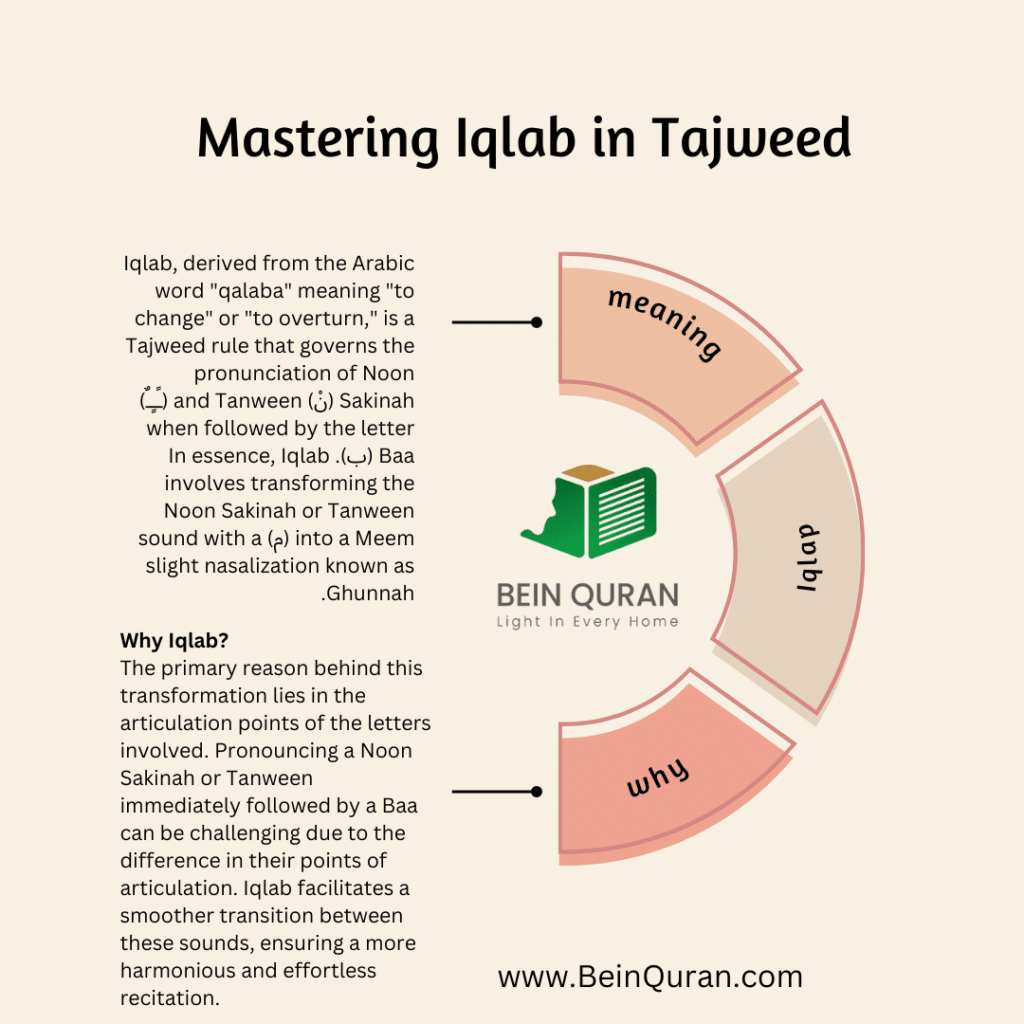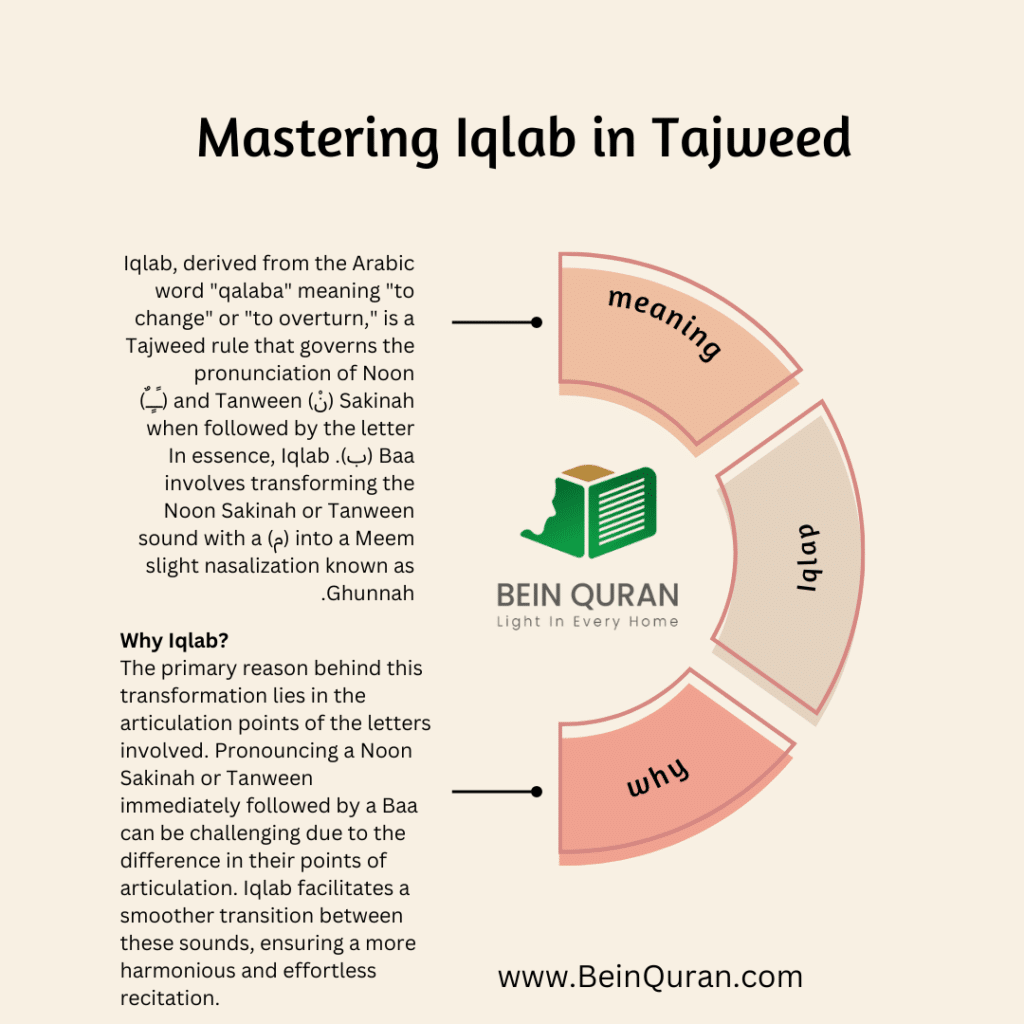Tajweed
Mastering Iqlab: A Comprehensive Guide to this Essential Tajweed Rule
The beauty and rhythm of Quranic recitation are deeply intertwined with the precise application of Tajweed rules. Among these rules, Iqlab stands out as a subtle yet crucial element that elevates the recitation to a higher level of fluency and elegance. This comprehensive guide delves into the intricacies of Iqlab, providing a clear understanding of its definition, pronunciation, application, and significance in enhancing your Quran recitation.
What is Iqlab?
Iqlab, derived from the Arabic word “qalaba” meaning “to change” or “to overturn,” is a Tajweed rule that governs the pronunciation of Noon Sakinah (نْ) and Tanween (ـًـٍـٌ) when followed by the letter Baa (ب). In essence, Iqlab involves transforming the Noon Sakinah or Tanween into a Meem (م) sound with a slight nasalization known as Ghunnah.
Why Iqlab?
The primary reason behind this transformation lies in the articulation points of the letters involved. Pronouncing a Noon Sakinah or Tanween immediately followed by a Baa can be challenging due to the difference in their points of articulation. Iqlab facilitates a smoother transition between these sounds, ensuring a more harmonious and effortless recitation.

Rules of Iqlab:
- Presence of Noon Sakinah or Tanween: Iqlab only applies when a Noon Sakinah or Tanween is followed by the letter Baa.
- Complete Transformation: The Noon Sakinah or Tanween must be fully converted into a Meem sound. No trace of the original Noon sound should remain.
- Ghunnah: The resulting Meem sound should be pronounced with a light nasalization (Ghunnah), similar to the Ghunnah in Idgham. The duration of this Ghunnah is approximately two counts.
- No Merging: Unlike Idgham, where the Noon Sakinah or Tanween merges into the following letter, Iqlab maintains a distinct Meem sound before transitioning to the Baa.
Identifying Iqlab in the Quran:
In some Quranic prints (mushaf), Iqlab is indicated by a small Meem symbol above the Noon Sakinah or Tanween when it precedes a Baa. This visual cue aids in recognizing and applying the rule during recitation.
Examples of Iqlab:
- Within a word:
- أَنْبِئْهُمْ (anbi’hum) – The Noon Sakinah in “an” is changed to a Meem with Ghunnah before pronouncing the “bi”.
- يُنْبِتُ (yunbitu) – The Noon Sakinah in “yun” is changed to a Meem with Ghunnah before pronouncing the “bi”.
- Between words:
- مِن بَعْدِ (min ba’di) – The Noon Sakinah at the end of “min” is changed to a Meem with Ghunnah before pronouncing “ba’di”.
- عَلِيمٌ بِذَاتِ (AAaleemun bi thaati) – The Tanween at the end of “AAaleemun” is changed to a Meem with Ghunnah before pronouncing “bi”.
You can apply for Tajweed Course with our academy
Pronunciation Guide:
To pronounce Iqlab correctly, follow these steps:
- Identify: Recognize the presence of a Noon Sakinah or Tanween followed by a Baa.
- Transform: Change the Noon Sakinah or Tanween into a Meem sound.
- Nasalize: Add a light Ghunnah to the Meem sound, holding it for about two counts.
- Transition: Smoothly transition from the nasalized Meem sound to the Baa.
Benefits of Learning Iqlab:
- Enhanced Recitation: Applying Iqlab elevates the beauty and fluency of your Quran recitation.
- Deeper Understanding: Mastering this rule demonstrates a commitment to accurate and proper recitation.
- Spiritual Connection: Reciting the Quran with Tajweed enhances your connection with the divine words and increases the rewards of your recitation.
Tips for Mastering Iqlab:
- Listen to Recitations: Pay close attention to how experienced reciters apply Iqlab in their recitation.
- Practice Regularly: Consistent practice is key to mastering any Tajweed rule, including Iqlab.
- Seek Guidance: Learn from qualified Quran teachers who can provide personalized feedback and correction.
- Utilize Resources: Explore online resources, videos, and interactive tools to enhance your understanding and practice.
Conclusion:
Iqlab is a fundamental Tajweed rule that plays a significant role in beautifying and perfecting Quranic recitation. By understanding its principles and practicing its application, you can elevate your recitation to new heights, deepening your connection with the Quran and reaping the abundant rewards associated with its proper recitation.
FAQs About Iqlab
Q1: What is the symbol for Iqlab in the Quran?
In Tajweed Mushafs, a small meem (م) is placed above the Noon Saakinah or Tanween where Iqlab applies.
Q2: Does Iqlab apply to all letters?
No, Iqlab applies only when Noon Saakinah or Tanween is followed by the letter Baa.
Q3: Can Iqlab occur across words?
Yes, Iqlab can occur within a word or between two words.
What is the basic definition of Iqlab in Tajweed?
Iqlab is a Tajweed rule that involves changing the pronunciation of Noon Sakinah (نْ) or Tanween (ـًـٍـٌ) into a Meem (م) sound with a slight nasalization (Ghunnah) when followed by the letter Baa (ب).
Q4. Why is Iqlab necessary in Quran recitation?
Iqlab ensures a smoother transition between the sounds of Noon Sakinah/Tanween and Baa, which have different articulation points. It makes the recitation more harmonious and effortless.
Q5. How do I know when to apply Iqlab?
Apply Iqlab whenever you encounter a Noon Sakinah or Tanween immediately followed by the letter Baa. Some Quranic prints (mushaf) may have a small Meem symbol above the Noon Sakinah or Tanween to indicate Iqlab.
Q6. Can you provide some examples of Iqlab from the Quran?
- Within a word: أَنْبِئْهُمْ (anbi’hum), يُنْبِتُ (yunbitu)
- Between words: مِن بَعْدِ (min ba’di), عَلِيمٌ بِذَاتِ (AAaleemun bi thaati)
Q7. How is Iqlab different from Idgham?
In Idgham, the Noon Sakinah/Tanween merges completely into the following letter. In Iqlab, the Noon Sakinah/Tanween transforms into a Meem sound with Ghunnah before transitioning to the Baa.

